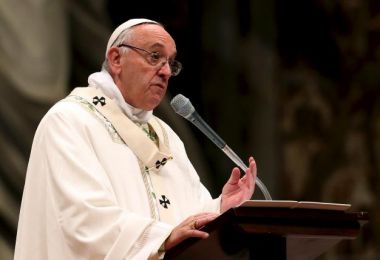Amoris Laetitia: 10 key quotes on marriage and the family from Pope Francis

Pope Francis' exhortation Amoris Laetitia (The Joy of Love) will disappoint people who wanted him to come out in support of gay marriage and easy divorce (he doesn't) and also those who wanted him to take a harder line on the evils of the modern world and the trouble with young people today (he doesn't do that either). Instead he has produced an insightful and inspirational document that calls Christians to realise the depths of the riches possible in marriage and family life. Here are 10 quotes that give a flavour of his thinking.
1. "Since 'time is greater than space', I would make it clear that not all discussions of doctrinal, moral or pastoral issues need to be settled by interventions of the magisterium."
The Catholic Church is a world-wide communion. Francis is trying to move it from a top-down organisation in which everything's decided by Rome.
2. "The ideal of marriage, marked by a commitment to exclusivity and stability, is swept aside whenever it proves inconvenient or tiresome. The fear of loneliness and the desire for stability and fidelity exist side by side with a growing fear of entrapment in a relationship that could hamper the achievement of one's personal goals."
Francis is reflecting on the vast freedom of choice we have today and its potential for corruption. We become selfish and lose the ability to focus and commit to one person.
3. "We find it difficult to present marriage more as a dynamic path to personal development and fulfilment than as a lifelong burden."
He is anxious to move the Church's thinking away from rule-based approaches to marriage and relationships and towards a deeper appreciation of what a life-long commitment to marriage can be.
4. "We treat affective relationships the way we treat material objects and the environment: everything is disposable; everyone uses and throws away, takes and breaks, exploits and squeezes to the last drop. Then, goodbye."
He's far from approving the culture of transient relationships that characterises the modern Western world. Self-discipline is needed.
5. "No one can think that the weakening of the family as that natural society founded on marriage will prove beneficial to society as a whole. The contrary is true: it poses a threat to the mature growth of individuals, the cultivation of community values and the moral progress of cities and countries."
Francis argues that marriage is vital for the whole of society and that society ought to be working to strengthen and preserve it.
6. "The verbal, physical, and sexual violence that women endure in some marriages contradicts the very nature of the conjugal union."
He is outraged by abusive relationships, also referring to female genital mutilation and discrimination against women in the workplace. He condemns 'male chauvinism'.
7. "So great is the value of a human life, and so inalienable the right to life of an innocent child growing in the mother's womb, that no alleged right to one's own body can justify a decision to terminate that life, which is an end in itself and which can never be considered the 'property' of another human being."
Francis is resolute in his reassertion of the Church's rejection of abortion.
8. "My advice is never to let the day end without making peace in the family. And how am I going to make peace? By getting down on my knees? No! Just by a small gesture, a little something, and harmony within your family will be restored. Just a little caress, no words are necessary."
Amoris Laetitia is not all high-flown theology. There is a good deal of practical wisdom in it as well.
9. "If, in the first years of marriage, a couple's experience of love grows stagnant, it loses the very excitement that should be its propelling force. Young love needs to keep dancing towards the future with immense hope."
The second sentence is a resonant expression of confidence in God's gift of love and marriage that will be repeated at many weddings in the coming years.
10. "Discernment must help to find possible ways of responding to God and growing in the midst of limits. By thinking that everything is black and white, we sometimes close off the way of grace and of growth, and discourage paths of sanctification which give glory to God."
Francis urges the need for restoration and inclusion on the part of the Church. The fact that someone has failed or is in a morally confused situation doesn't mean they are excluded from the grace of God.
Follow Mark Woods on Twitter: @RevMarkWoods











